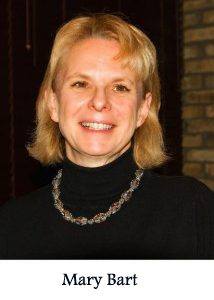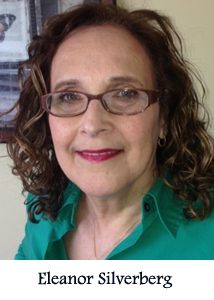 In her mid 40s, Mary Bart became the primary caregiver for her mother, with Alzheimer’s, and father, with cancer. For 10 years, often seven days a week, Mary drove 40 minutes south to her parents’ home where she did “all the things that daughters do,” she explained.
In her mid 40s, Mary Bart became the primary caregiver for her mother, with Alzheimer’s, and father, with cancer. For 10 years, often seven days a week, Mary drove 40 minutes south to her parents’ home where she did “all the things that daughters do,” she explained.
A day in the life of Mary included taking her folks to medical appointments, cleaning the house, doing laundry, keeping the home stocked and meds on track, and generally ensuring her mom and dad were as clean, healthy, safe and comfortable as she could.
“Sometimes I’d take a day off, usually a Sunday,” she said. “And when I did, my dad would be very upset, and all kinds of guilt would be thrown my way.”
Needless to say, maintaining full-time employment while fulfilling her caregiving obligations was not an option for Mary. She left her corporate gig in the technology field to focus on caring for her parents.
A woman’s job
Caregiving has been described as one of the world’s most challenging jobs. Yet, many are thrown into it with little warning and no training, on top of demanding 9-to-5s.
Women bear the brunt of this burden, as two-thirds of all caregivers are female, many of whom feel that they sometimes have to choose between being a good employee and being a good daughter.
It is estimated that, every year, Canada loses the equivalent of nearly 558,000 full-time employees from the workforce due to the inability to manage the conflicting demands of paid work and care.
Mary’s alternative
Many days, Mary felt honoured to care for her parents, as they once had for her. But other days, she nearly went out of her mind. She also dealt with a common caregiver issue: guilt.
“Early into my caregiving journey, I freed myself from any guilt,” she explained. “Today, I miss them dearly, but I have no guilt; I can clearly separate grief from guilt, two very different things. I did the best I could, based on my energy and resources.”
About a year before her mother passed, Mary knew her mom’s path would soon end. In her 50s, and out of the workforce for a decade, she decided to reinvent herself to find ways to add purpose to her life.
“I had no desire to go back to the corporate world,” she said. “I thought, ‘there must be other caregivers out there who are experiencing what I have.’”
Caregiving Matters
 Like any purposeful pioneer, Mary identified a need in the current market and sought to fill it with her expertise. In 2008, coupling her 18-year professional technology background with a recent decade of personal, hands-on caregiving experience, she founded Caregiving Matters, an internet-based registered Canadian charity offering education and support to family caregivers.
Like any purposeful pioneer, Mary identified a need in the current market and sought to fill it with her expertise. In 2008, coupling her 18-year professional technology background with a recent decade of personal, hands-on caregiving experience, she founded Caregiving Matters, an internet-based registered Canadian charity offering education and support to family caregivers.
Ninety per cent of the charity’s efforts are driven through its website, which features full-length articles on relevant topics, blog posts, video workshops, podcasts with industry experts, and more.
“We leverage technology in everything we do to ensure a greater reach and sustainability,” Mary explained. “Users from more than 64 countries visit our site.”
The other 10 per cent of the charity’s resources are focused on live educational events in the GTA and surrounding regions.
“We tend to deal with tougher topics and ones that don’t get a lot of attention, like financial and legal issues among families,” said Mary. “We are honoured to work with lawyers and accountants who volunteer their time to share their knowledge.”
Caregiving Credibility
 Eleanor Silverberg, owner and director of Jade Self Development Coaching, has been a grief specialist helping family caregivers cope for nearly 20 years, 10 years as a social worker for the Alzheimer Society of York Region.
Eleanor Silverberg, owner and director of Jade Self Development Coaching, has been a grief specialist helping family caregivers cope for nearly 20 years, 10 years as a social worker for the Alzheimer Society of York Region.
She, too, was the primary caregiver for her mother and father, while raising teenagers—a circumstance she refers to as being a part of the “sandwich generation.”
An author and a recurring guest speaker on Caregiving Matters podcasts, blogs, and at live events, Eleanor finds the Caregiving Matters platform beneficial to industry professionals, in addition to caregivers in need of assistance.
“I just referred a podcast to my support group last week because we were talking about financial and estate matters,” Eleanor explained. “It’s great that there’s a resource where I can send people to get answers on issues like that.”
Care for the Caregivers
 Canada’s aging population is growing and fuelling caregiving needs across the country. By 2030, seniors are projected to account for close to one in four people.
Canada’s aging population is growing and fuelling caregiving needs across the country. By 2030, seniors are projected to account for close to one in four people.
Mary’s long-term goal is to raise awareness about Caregiving Matters and build upon its pool of resources to meet the growing demand for family caregiving support.
As Mary explained, “it’s a grassroots effort based on love and giving back, and it reaches a lot of people at a challenging time in their lives when they really need it.”
If you or someone you know is providing primary support to a family member, spouse, or loved one, visit the website and join the social communities:
I am a volunteer for Caregiving Matters. If you’d like to get involved, view volunteer opportunities.




Comments are closed.